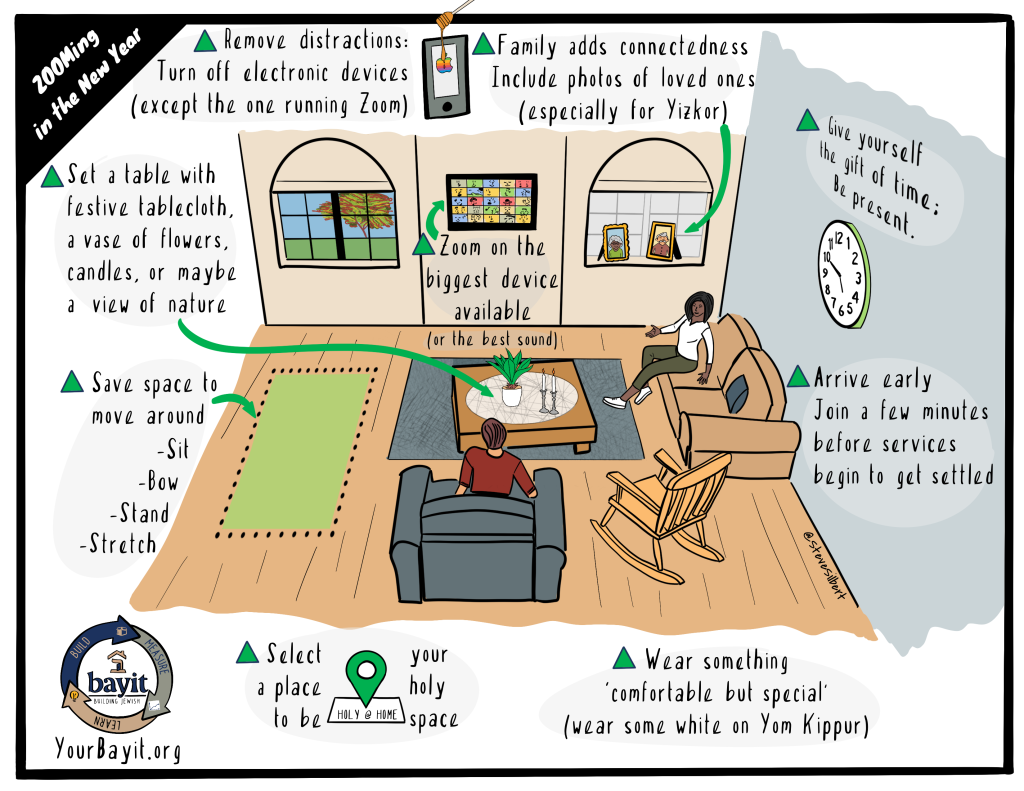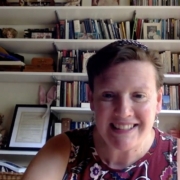
Dear Congregation Beth Israel members and friends,
I’ll never forget my mother’s first video call. My son was an infant, and she lived two thousand miles away. We arranged her first Skype call so she could visit the baby. I remember her amazement: that we could not only speak long-distance, but see each other, too! In later years, as her illness progressed and travel became impossible, we took comfort in lighting Shabbat candles together each week over video. It wasn’t “the same” as being together in person, but it was still real connection. It still mattered. It still touched our hearts.
Being together on Zoom isn’t “the same” as being together in person, but it’s still real connection. In these pandemic times, we need real human connection more than ever. This year’s Days of Awe will be unlike any other. Because of the pandemic, our building remains closed. It’s not safe for us to gather. Our High Holidays this year will be over Zoom videoconferencing, like our Shabbat services since the pandemic began. I know that this is not what we would wish… but it is the way to keep each other safe.
Being together over Zoom is real connection. If we bring our open hearts, we can experience our togetherness as real togetherness. We can experience prayer from our own homes as real prayer. Over these first months of pandemic I’ve been learning how to lead prayer over Zoom skillfully, how to work with the medium to take advantage of its unique opportunities, how to use images and music to enliven the experience. I’ve also been meeting with colleagues regularly to brainstorm, to harvest best practices, and to dream together about how we can make this year’s High Holidays meaningful and sweet.
Here are a few things I know already:
When we meet for the Days of Awe, we’ll use a special version of our regular machzor (high holiday prayerbook) designed to be shared over the screen. You won’t need a book: the words and images will appear on your screen alongside our faces. We’ll have ample opportunities to connect with each other. Our services will balance things that are familiar (this year more than ever, our hearts and souls will need some familiar melodies) and things that are new to this new medium. There will be music, there will be stirring words, there will be togetherness. (And services will be shorter than you expect, because I know that “Zoom fatigue” is real!) I’ll reach out regularly in the weeks leading up to the Days of Awe, offering tips and suggestions on how to prepare ourselves and our homes for this unprecedented holiday season.
Change is not new to Jewish life. When the Temple fell, we made the radical shift to offering the words of our hearts instead of animal sacrifices… and we made the radical shift from gathering for festivals in one centralized location (Jerusalem) to gathering in synagogues wherever in the world we might be. Today’s pandemic realities ask us to shift from gathering in synagogue buildings, to creating holy space from the many places where we are. Long ago our sages said that the Shabbat table is a “tiny altar,” a place of connection with God and with holiness. Now we make that even more true, by gathering via Zoom from our dining tables — our homes becoming portals to sacred space and community connection even when we are sequestered apart.
Although our building is closed, our community is open, and we still need your support. We continue to incur ongoing personnel, utilities, and maintenance expenses, and our staff has been working remotely to ensure that service to our members is uninterrupted. Book discussion groups, our refugee support committee, weekly Shabbat services and meditation services, Yizkor memorial services throughout the year, adult education offerings, and when fall comes around, Hebrew school: all of these continue, remotely, from the places where we are.
Your donations to our high holiday appeal this year will support all of these. They will also support digital infrastructure for these unique Days of Awe, which will help us to better serve our homebound members even after this pandemic is past. They will enable us to preserve our beautiful building so that when we can safely gather in person again, our physical home is ready for us to return. And they will support the continued flourishing of Jewish life in northern Berkshire.
Jewish tradition teaches that even one who receives tzedakah (e.g. someone who is fiscally struggling and needs to ask for support) must also give tzedakah. When we give, we prime the pump of blessing. When we give, we become part of the chain of giving that brings hope and abundance to the world. Please give as you are able to support CBI in these difficult times. The only donation that is too small is none at all.
We look forward to being with you at the Days of Awe this year — via video, and more importantly, via the heart-connections between us. Thank you for being a part of CBI.
Blessings,
Rabbi Rachel Barenblat
and Chris Kelly, President
On Digital Spiritual Life & The Jewish Future:
These two sermons were written for a Shabbat retreat, held over Zoom in June, focused on the question: how do we connect with each other and with Judaism online during these pandemic times, and what does that mean for the future of Jewish life?
- Being Real, Digital Edition — about connection, “virtual” and “real,” and the spiritual importance of bringing our whole selves to connection with each other and our traditions during these pandemic times and always — by R’ Rachel Barenblat
- The Mishkan’s Next Digital (R)Evolution — about Jewish life and change, and the spiritual implications of making a “mishkan” (a sacred space / a connection place with God) at our home dining tables during these pandemic times — by R’ David Markus











